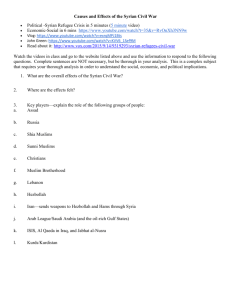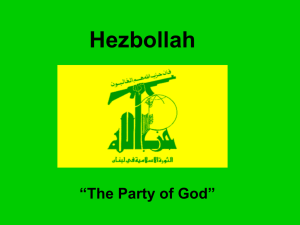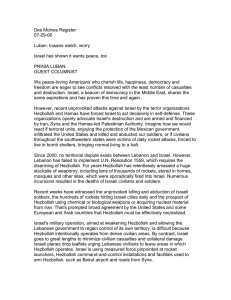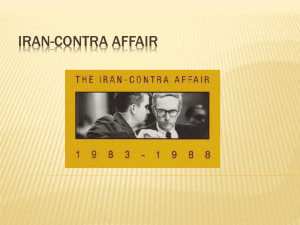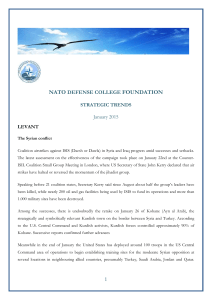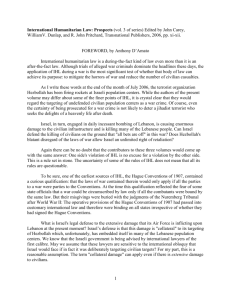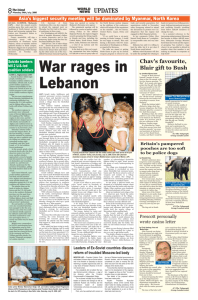United States House of Representatives
advertisement
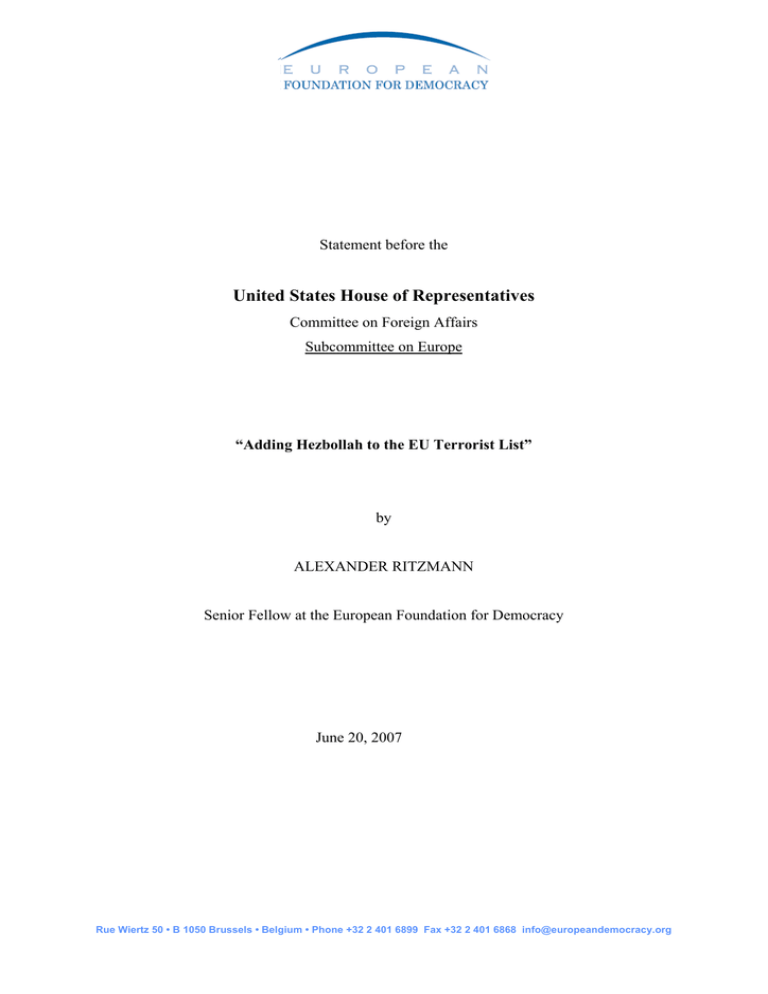
Statement before the United States House of Representatives Committee on Foreign Affairs Subcommittee on Europe “Adding Hezbollah to the EU Terrorist List” by ALEXANDER RITZMANN Senior Fellow at the European Foundation for Democracy June 20, 2007 Rue Wiertz 50 • B 1050 Brussels • Belgium • Phone +32 2 401 6899 Fax +32 2 401 6868 info@europeandemocracy.org Chairman Wexler, ranking member Gallegly, members of the committee, thank you very much for the invitation to speak to you today. It is a real pleasure and an honor to be here. The mission of the European Foundation for Democracy (EFD), where I serve as a senior fellow, is to defend democratic values, promote freedom, and counter the ideologies that drive terrorism. Based in Brussels, EFD works closely with European institutions as well as with individuals across the ethnic and political spectrum. In addition to supporting democracy and freedom around the world, our efforts also focus on the rule of law, gender equality, minority rights and independent judiciaries. EFD and our partners at a European and transatlantic level support liberal democrats throughout the world who call for reform and condemn radical or violent ideologies. Allow me a few words about Hezbollah in Europe. During the time that I was a member of the Berlin state Parliament, I became increasingly concerned about the growth of Hezbollah not only in Germany but throughout Europe. Hezbollah arrived in the European Union in the 1980s, along with refugees from the civil war in Lebanon. Despite its deadly track record and a 2005 European Parliament resolution recommending the banning of the Iranian-funded group, it is still legal on the Continent. France, Spain, Belgium and Sweden prevent the EU from jointly designating Hezbollah as a terrorist organization. Although it is closely monitored by German law enforcement and intelligence, Hezbollah enjoys significant operational freedom. In the late 1990s, for example, it was able to recruit in Germany Steven Smyrek, a German convert to Islam, and train him in Lebanon as a suicide bomber. He was luckily arrested at the Tel Aviv airport before he could blow up Israeli civilians. German security services believe that about 900 Hezbollah activists are in the country and regularly meet in 30 cultural community centers and mosques. These activists financially support Hezbollah in Lebanon through fund-raising organizations, such as the "Orphans Project Lebanon Association." This harmless-sounding charity belongs to the Lebanese al-Shahid (the Martyr) Association, which is part of the Hezbollah network that supports the families of militia fighters and suicide bombers. According to a German government report from February, the attitude of Hezbollah supporters in Germany "is characterized by a far-reaching, unlimited acceptance of the ideology and policy (of Hezbollah)." Berlin is also aware that representatives of Hezbollah's "foreign affairs office" in Lebanon regularly travel to Germany to give orders to their followers. So why does the German government tolerate these activities? First, the Hezbollah leadership in Beirut recognizes the value of a German safe haven, along with other countries in Europe where Hezbollah acts with impunity. Hezbollah members carefully obey most German laws. But experience from attacks in the U.S., Britain and elsewhere suggest, however, that terrorists follow the law up and until the point they decide to strike. I would add that the most likely scenario for Hezbollah carrying out attacks in Europe is 2 Rue Wiertz 50 • B 1050 Brussels • Belgium • Phone +32 2 401 6899 Fax +32 2 401 6868 info@europeandemocracy.org not a sudden surprise attack by Hezbollah members but rather a) Hezbollah used as a retaliatory force following serious action against Iran; or, b) Hezbollah adopting a threatening posture on Iran’s behalf. Second, too many German policymakers uncritically accept the idea that there is a political Hezbollah -- an Islamist but legitimate movement independent of those Hezbollah terrorists who have murdered hundreds of people around the world. They do this at their own peril and even ignore Hezbollah's own words. As Mohammed Fannish, member of the so-called political bureau of Hezbollah and former Lebanese energy minister, put it in 2002: "I can state that there is no separating between Hezbollah's military and political arms." Hezbollah's leadership, the Shurah Council, controls the totality of its activities -- social, political and what it calls "military." Funding for Hezbollah is fungible: Money collected in Germany supposedly for social and political causes frees up funds for terrorist attacks. In ignoring the threat from Hezbollah and the scope of its operations, the German government – and other European countries – are putting hope above experience. In the end, this approach compromises the safety of European citizens. For example, on July 31, 2006, two Lebanese students, Yussuf Mohammed El Hajdib and Jihad Hamad, placed bombs hidden in suitcases on two regional trains in Germany, but they failed to go off. Germany's federal law enforcement agency concluded that a successful explosion would have resulted in a tragedy on par with the London subway attacks of July 2005. The two suspects said they wanted to take revenge for the Danish cartoons of the prophet Mohammed. Just four month earlier, on a broadcast reaching all of Europe, Hezbollah leader Hassan Nasrallah repeatedly urged Muslims on Hezbollah's TV-station Al-Manar "to take a decisive stand" in the cartoon controversy (see details below). While the German federal prosecutor is still investigating the organizational affiliations of these two Lebanese terror suspects, it is clear that the role of Al-Manar as a tool of incitement, fundraising and recruitment for Hezbollah is a significant security problem in Europe. The following questions regarding this hearing’s topic of “Adding Hezbollah to the EU Terrorist List” will be addressed in my testimony today. 1) Why is it important for the European Union (EU) to add Hezbollah to its terrorist list? 2) How does the EU designation process work? 3) What is the impact of a designation? 4) Why is Hezbollah not yet a designated terrorist organization by the EU? 5) What can be done to encourage Hezbollah’s designation as a terrorist entity by the EU? 1) Why is it important for the European Union (EU) to add Hezbollah to its terrorist list? a) Hezbollah is a threat to EU interests Hezbollah has been actively involved in terrorism ever since its creation in 1982. Hezbollah is known internationally for its kidnappings, hijackings and bombings against U.S. and European interests and its ongoing attacks against Israel. Before turning to Hezbollah’s threat against the EU specifically, I would note a) that Hezbollah has struck Western targets, such as the Marine barracks in Beirut in October 1983 and the American embassy in Beirut in September 1984. In the mid-1980s, Hezbollah kidnapped a large number of Americans in Lebanon, and caused the death of several—including CIA station chief William Buckley and American University of 3 Rue Wiertz 50 • B 1050 Brussels • Belgium • Phone +32 2 401 6899 Fax +32 2 401 6868 info@europeandemocracy.org Beirut librarian Peter Kilburn; b) in the 1990s, Hezbollah went international, with attacks on Jewish and Israeli targets in Argentina, and evidence suggesting that Hezbollah tried to carry out attacks on Jewish/Israeli targets in London, Thailand, and Singapore. Hezbollah has also proven in the past that it is willing and capable of striking within the EU. In the 1980s and 1990s Hezbollah killed French peacekeeping forces in Beirut and carried out bombings in France and Spain as well as assassinations in Germany and Italy. Hezbollah operates networks for funding, recruitment, training and logistics in many of the EU member states and has used EU territory as a launching pad from which operatives infiltrate into Israel to conduct surveillance and carry out attacks. Hezbollah has been credited with inventing the modern use of 'suicide bombing', and is openly providing training, funding and logistics to HAMAS and Palestinian Islamic Jihad which are designated terrorist organizations by the EU. b) Hezbollah radicalizes Muslim communities in the EU Hezbollah activists and propaganda outlets spread a consistent message of hate against Western values and encourage violent jihad as means to act on these sentiments. As I have noted, it broadcasts anti-Americanism, anti-Semitism and incitement against the West in the EU through its TV station Al Manar and various websites. Hezbollah’s hate propaganda includes calls of “Death to America,” “Death to Israel,” the glorification of martyrdom and the dehumanization of Israelis as well as of Jews. To give a typical example, Hezbollah leader Hassan Nasrallah said the following in context of the cartoon controversy in 2006 which was broadcasted repeatedly by Al-Manar: "If any Muslim had carried out the fatwa of Imam Khomeini against the apostate Salman Rushdie, those despicable people would not have dared to insult the Prophet Muhammad - not in Denmark, not in Norway, and not in France... I call upon ...all the Muslims to take a decisive stand... I am certain that not only millions, but hundreds of millions, of Muslims are ready and willing to sacrifice their lives in order to defend the honor of their Prophet. And you are among them." Interviews of radicalized Muslim youth on German television have shown that they use AlManar TV as their primary source of information. The incitement broadcast on Al-Manar has received the attention of members of Congress, the US Administration, European legislators, and European audiovisual authorities, working with non-governmental organizations including the Coalition Against Terrorist Media (CATM), comprised of Muslim, Christian, Jewish, and secular organizations, including my organization, the European Foundation for Democracy and the Washington-based Foundation for Defense of Democracies. As a result of these efforts, Al Manar was dropped from four European satellite providers -- Spanish, Dutch and two French -- to enforce the European Union’s Television Without Frontiers directive against “incitement to racial and/or religious hatred.” The US Treasury Department has designated Al-Manar a Specially Designated Global Terrorist entity. Four other satellite providers -- US, Brazilian, Australian and one Hong-Kong based provider -- terminated broadcasting of the station and multinational advertisers ceased almost $2 million in annual advertising on the station. Al-Manar, however, is still broadcasting into Europe, the Middle East, and North Africa from its two remaining satellite providers, the 4 Rue Wiertz 50 • B 1050 Brussels • Belgium • Phone +32 2 401 6899 Fax +32 2 401 6868 info@europeandemocracy.org Egyptian-based Nilesat and the Saudi-based ARABSAT. If European countries want to send a strong message to these satellite providers and the countries that host them that incitement to violence broadcasting into living rooms throughout Europe is unacceptble, the designation of Hezbollah is an important first step. Although there have been no more Hezbollah attacks in the EU in recent years, the organization maintains its capability to carry out such attacks. As I have noted, Hezbollah’s operationalterrorist capability also constitutes a potential weapon in the hands of the Iranian regime, which it can utilize in the future in line with “strategic considerations” e.g., in advance or in response to a US or an Israeli offensive against Iran’s nuclear facilities. 2) How does the EU designation process work? The decision on whether or not to include or remove an individual or an organization on the EU list of terrorist organizations is made by the Council of Ministers. Individual cases are examined by the "Clearing House," a technical working group of the Council of Ministers comprised of national experts from law enforcement and judicial authorities as well as intelligence services. Which bodies are represented depends on the individual member states and on how they are structured. According to the rules, evidence for ongoing terrorist activities has to be presented. The decisions to include organizations or individuals for designation are revised every six months. Details about the actual members of the Clearing House and on what grounds individuals or entities finally become listed or not remain classified. All decisions relating to the EU terrorist list have to be made by the unanimous agreement of the 27 EU member states. In short, the Clearning House process’s lack of transparency and the requirement for consensus on the part of all 27 EU members make designation an important though difficult goal but one that should be considered as part of a fuller list of options to hinder Hezbollah’s operations in Europe. 3) What would be the impact of a designation? An EU designation would permit the European Union and member states to initiate a process of “freezing the funds and other financial assets or economic resources” of Hezbollah; EU member states could “ensure that funds, financial assets or economic resources or financial or other related services will not be made available, directly or indirectly,” for the benefit of Hezbollah. Although observers believe that Hezbollah receives annual support of about $100 million from Iran, the designation of Hezbollah by the EU would be a significant step in the effort to stem the group’s international financial activity. In 2005 Hezbollah leader Hassan Nasrallah spelled out the consequences of a designation by the European Union: "The sources of funding will dry up and the sources of moral, political and material support will be destroyed." 4) Why is Hezbollah not yet a designated terrorist organization by the EU? There are several points to be made about why Hezbollah has not yet been designated a terrorist orgnization by the EU. While Britain and Germany have lobbied for the EU to include Hezbollah on its terrorist list, other European counties - notably France, Sweden, Greece, Spain, Italy and Belgium - have 5 Rue Wiertz 50 • B 1050 Brussels • Belgium • Phone +32 2 401 6899 Fax +32 2 401 6868 info@europeandemocracy.org opposed the idea. There is, however, contradicting information available about the actual position of other EU member states regarding this question. Even while the E.U. has not designated Hezbollah as a terrorist organization, several member countries have taken action on their own. On May 3, 2002, the EU placed several individual Hezbollah terrorists, including Hezbollah's "Senior Intelligence Officer" and head of international operations Imad Mugniyah on its terrorist list. In 2004 the Netherlands designated Hezbollah a terrorist organization, concluding "that Hezbollah's political and terrorist wings are controlled by one coordinating council. This means, the Dutch government concluded, that “there is indeed a link between these parts of the organization. The Netherlands has changed its policy and no longer makes a distinction between the political and terrorist Hezbollah branches." The United Kingdom designated Hezbollah’s external security organization as a terrorist entity. In Aug 2006, the Finnish Presidency of the EU stated: “The EU will not for the time being put the Islamist Hezbollah movement on its blacklist of terrorist organizations but the discussion could re-emerge in the future.” On 10 March 2005 the European Parliament passed a non-binding resolution recognizing "clear evidence" of "terrorist activities by Hezbollah. The EU Council should take all necessary steps to curtail them.” The EU Council, however, has refused to act yet. The key arguments brought forward by those opposing Hezbollah’s designation as a terrorist organization are that: A) The designation would destabilize Lebanon and the Middle East peace process. B) Hezbollah is a legitimate resistance movement against Israeli occupation, not a terrorist organization. C) Hezbollah, the “Party of God”, is a legitimate political party with separate political, social and military wings. Allow me to examine these hypotheses: Destabilizing Lebanon and the Middle East Peace Process Hezbollah has been identified as a key destabilizing factor in Lebanon. Amongst its stated objectives are the establishment of a Shiite theocracy in Lebanon, the destruction of Israel and the elimination of Western influences from the region. Taking those objectives into consideration, it seems extremly unlikely that Hezbollah is interested in stabilizing the fragile pluralistic political system in Lebanon. Regarding the broader Middle East peace process, Hezbollah has openly opposed any peace negotiations between the PLO and Israel and called former PLO chairman Yassir Arafat a traitor to the Palestinian cause. In 2005 the Palestinian Authority called for Hezbollah’s designation as a terrorist organization by the EU as the PA regarded the organization as the single most dangerous threat to the peace process. Hezbollah is a resistance movement against Israeli occupation Hezbolah claims that it is a resistance movement fighting against Israel. Since Israel’s withdrawal from Lebanon in 2000, Hezbollah now claims that Israel still occupies the so-called 6 Rue Wiertz 50 • B 1050 Brussels • Belgium • Phone +32 2 401 6899 Fax +32 2 401 6868 info@europeandemocracy.org Sheba farms. According to the United Nations, however, Israel has fully withdrawn from Lebanese territory. Even Syria, Hezbollah’s sponsor, claims that the Sheba farms are Syrian not Lebanese territory. The Sheba farms claim is not plausible. Hezbollah is a legitimate political party According to its own words Hezbollah is not a political party. In an interview granted on April 16, 2007 to Al-Kawthar, an Iranian TV channel, Sheikh Naim Qassem, Hassan Nasrallah’s deputy, explained that Hezbollah was founded and commenced activities in 1982, based on a religious ruling made by Iranian Imam Khomeini, who considered jihad against Israel to be an Islamic religious duty. Qassem also stressed that Hezbollah’s policy of terrorist operations against Israel (including suicide bombings and rocket fire) requires jurisprudent permission of the Iranian leadership. As I have noted, Muhammad Fannish, member of the political bureau of Hezbollah and former Lebanese energy minister stated: “... there is no separating between Hezbollah’s military and political branch.” Hezbollah’s leadership, the Shurah council, controlls all its activities, whether they are social, political or military. The broad support of Hezbollah within the Shiite Muslim community in Lebanon seems to be strongly related to its social and economic activities. The UN Office for the Coordination of Humanitarian Affairs noted in March 2006: "Hezbollah currently operates at least four hospitals, 12 clinics, 12 schools and two agricultural centers. It also has an environmental department and an extensive social assistance program. Medical care is also cheaper than in most of the country's private hospitals and free for Hezbollah members." Ahmad Nizar Hamzeh, a professor at American University in Beirut, characterized Hezbollah in the following terms: “Hezbollah is first and foremost a jihadi movement that engages in politics, and not a political party that conducts jihad.” In addition to the considerations above which have been used in arguing against the designation of Hezbollah, some EU member states remain reluctant to confront Hezobllah for fear of potential retaliation of Hezbollah against their UNIFIL soldiers in Lebanon or even civilian targets at home. Other member states do not feel affected or threatened by Hezbollah and feel little urgency to act. The different interests and perceptions of the problem within the EU membership make achieving unanimity very difficult. 5) What can be done to encourage Hezbollah’s designation as a terrorist entity by the EU? To achieve its objective of convincing the EU to designate Hezbollah, the U.S. should apply pressure in a low profile manner refraining from publicly criticizing European leaders. A more effective approach is to work with select European allies and to provide additional information, intelligence and constructive arguments that these allies can use within Europe. The Hezbollah threat must be perceived as a threat to EU interests and not just a US priority. This can be accomplished by identifying and working with European experts who can shed light on Hezbollah’s activities and bring a deeper understanding of how Hezbollah uses Europe as a base for terrorism to European policymakers and the European public. 7 Rue Wiertz 50 • B 1050 Brussels • Belgium • Phone +32 2 401 6899 Fax +32 2 401 6868 info@europeandemocracy.org As noted earlier, the Clearing House process is an important one, but requires the consensus of 27 countries in order for Hezbollah to be designated. As such the U.S. ought to assume a twostep process. The process would focus both on getting consensus by member countries to designate Hezbollah as a terrorist organization and would encourage each country to designate Hezbollah as a terrorist organization within their own governments. It is important to note there that many of the EU countries do not have a mechanism to designate organizations as terrorist entities – even though such a mechanism is required under UN Security Council Resolution 1373. The U.S. ought to work with them to establish such mechanisms and as well as appropriate targeted sanctions regimes. Other actions the U.S. should consider include: • Establishing a transatlantic working group on Hezbollah comprised of legislators from the subcommittee and their counterparts from EU national governments and the EU parliament. • Legislating the provision of regular reports about Hezbollah criminal and terrorist activity by Congress and encouraging similar reports by EU legislators, security officials and the intelligence community. • Calling on European government and counterterrorism officials and experts to appear before the working group to testify on why Hezbollah should be designated. From my experience, the German government has shown strong resolve when it saw a threat to German security. It banned the Hamas "charity" al-Aqsa as well as the radical Sunni Islamist Hizb-ut Tahrir group. And it joined the EU in designating both HAMAS, as well as the PKK, the radical Kurdish group, as terrorist organizations. Would branding the "Party of God" a terrorist group make any difference? Let me come back to the words of Nasrallah himself: European blacklisting would "destroy Hezbollah. The sources of our funding will dry up and the sources of moral, political and material support will be destroyed." I thank you for the opportunity to appear before this subcommittee and am grateful that you have given me the chance to share a perspective from Europe. While you will find many who do not share my view on the importance of designating Hezbollah, in my experience, once European leaders and the general population considers this more thoroughly, you will find partners who understand the need to address this serious threat. 8 Rue Wiertz 50 • B 1050 Brussels • Belgium • Phone +32 2 401 6899 Fax +32 2 401 6868 info@europeandemocracy.org
